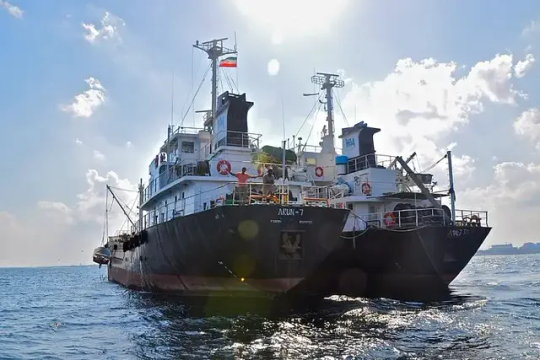#WatertightDoorRequirements
Text
UK Adopts Ambulatory Reference for Maritime Compliance

Ambulatory Reference
In a move to align itself with international maritime standards, the United Kingdom has adopted significant amendments to its domestic legislation concerning damage stability in cargo ships, load line protocol, and the prevention of pollution by noxious liquid substances carried in bulk. These changes will ensure that the UK remains in harmony with international merchant shipping requirements.
A Step Towards Maritime Consistency
The Secretary of State for Transport, in fulfilling its obligation to implement international amendments into UK domestic law, has announced these crucial changes. The strategy involves the use of ambulatory reference, allowing amendments to international obligations to be automatically integrated into UK domestic law, and keeping the nation compliant with international maritime standards.
A Closer Look at the Amendments
This statement outlines three sets of amendments that will come into force in the UK via ambulatory reference provisions in the relevant domestic regulations.
Amendment 1: Damage Stability in Cargo Ships
The first amendment pertains to damage stability in cargo ships, specifically focusing on requirements for watertight doors. The International Maritime Organization (IMO) noticed inconsistencies in provisions for watertight doors in mandatory cargo ship construction requirements. As a result, they have made amendments to relevant international instruments to align with these requirements. Importantly, this amendment does not introduce new requirements but rather harmonizes existing ones.
To achieve this, Annex I of the International Convention for the Prevention of Pollution from Ships, 1973 (MARPOL) is amended to better align requirements for watertight doors on oil tankers with those of SOLAS. The International Maritime Organization's Resolution MEPC.343(78) instigates this change, and it will be effective in the UK on 1st January 2024 through the ambulatory reference provision in the Merchant Shipping (Prevention of Oil Pollution) Regulations 2019.
Resolutions MEPC.345(78) and MSC.526(106) further amend the International Code for the Construction and Equipment of Ships Carrying Dangerous Chemicals in Bulk (IBC Code) to align requirements for watertight doors on chemical tankers with SOLAS standards. This amendment, as made mandatory by MARPOL, will take effect in the UK on 1st July 2024, following the ambulatory reference provision in the Merchant Shipping (Prevention of Pollution by Noxious Liquid Substances in Bulk) Regulations 2018. The implementation as made mandatory by SOLAS will follow suit on 1st July 2024 upon the introduction of new regulations (the draft Merchant Shipping (Carriage of Dangerous Goods and Harmful Substances) Regulations 2024).
Resolution MSC.492(104) introduces amendments to the International Code for the Construction and Equipment of Ships Carrying Liquefied Gases in Bulk (IGC Code) to bring watertight door requirements on gas carriers in line with SOLAS standards. This change will become effective on 1st January 2024 and will be implemented alongside new regulations (the draft Merchant Shipping (Carriage of Dangerous Goods and Harmful Substances) Regulations 2024), making compliance with the IGC Code ambulatory.
Amendment 2: Editorial Correction in Load Line Protocol
The second amendment, also sanctioned by Resolution MSC.491(104), is a minor editorial correction. It pertains to regulation 22(1)(g) of Chapter III of Annex I of the 1988 Load Line Protocol. The amendment removes an erroneous reference to 'inlets' in a table outlining acceptable arrangements for scuppers and discharges.
This change will come into effect on 1st January 2024, via the ambulatory reference provision in the Merchant Shipping (International Load Line Convention) (Amendment) Regulations 2018.
Amendment 3: Pollution Prevention in Bulk Liquid Substances
Thirdly, an amendment to Annex II of MARPOL addresses the prevention of pollution by noxious liquid substances carried in bulk by sea. Resolution MEPC.344(78) modifies Appendix I of Annex II to update guidance used in the categorization of liquid chemicals.
This amendment subdivides the rating for inhalation toxicity, making it more relevant for shipboard operations, deletes an outdated rating for seafood tainting, and reassigns the column to rate flammability flashpoint.
Importantly, this does not change the current pollution categorization of noxious liquid substances nor impact substances already classified in the IBC Code. This amendment will be effective in the UK on 1st November 2023, facilitated through the ambulatory reference provision in the Merchant Shipping (Prevention of Pollution from Noxious Liquid Substances in Bulk) Regulations 2018.
Conclusion
These amendments represent a significant step for the UK in keeping pace with its international maritime obligations. The adoption of ambulatory reference provisions ensures that the country remains in alignment with global maritime standards, improving safety, sustainability, and efficiency in the maritime industry.
Sources: THX News, Maritime and Coastguard Agency, Department for Transport, & Baroness Vere of Norbiton.
Read the full article
#AmbulatoryReference#DamageStabilityinCargoShips#EditorialCorrectionLoadLine#InternationalMaritimeAmendments#LoadLineProtocolAmendments#MARPOLandSOLASAlignment#MerchantShippingRegulations#PollutionPreventionMARPOLAnnexII#UKShippingCompliance#WatertightDoorRequirements
0 notes